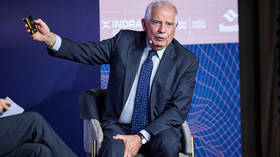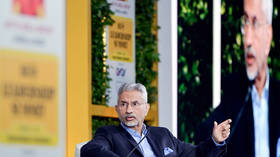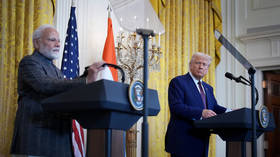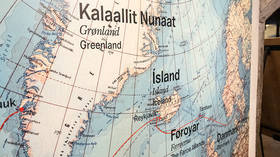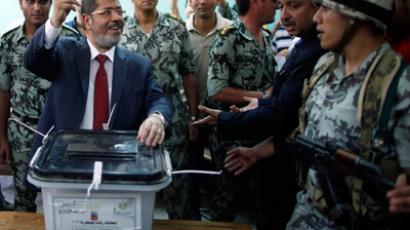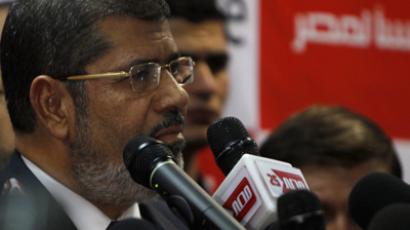Egypt salutes president: Tahrir goes mad as Morsi addresses the nation
Egyptian president-elect Mohamed Morsi, the first Islamist head of state in the Arab world's most populous nation, has delivered an encouraging speech stating that under his rule Christians and Muslims will unite and make Egypt proud and great again.
In his televised address to the nation, Morsi thanked the people of Egypt for making him president and vowed to continue the revolution until its goals are achieved, bringing huge applause from a crowd of his supporters on Tahrir Square in Cairo. As he spoke, the crowd went mad, cheering "Morsi! Morsi!"The new president also said that Egypt will respect all treaties but will not allow interference in Egypt's sovereignty and internal affairs.On Sunday, Egypt's election commission announced the official results in a televised press conference, naming Muslim Brotherhood candidate Morsi as the country's first post-revolution president. Morsi defeated former prime minister Ahmed Shafiq.The commission chairman also spoke at length about various voting violations, including fake identity cards and ballot stuffing. In all cases, the votes were either recounted or disqualified. In the end, Morsi received over 13 million, or 51.7 per cent, of the votes, while Shafiq got 48.27 per cent. A huge crowd of Morsi's supporters, who were waiting for the announcement on Tahrir Square, erupted into cheers and chants as the result was read. Hundreds of thousands of people set off fireworks, waved flags and chanted. The celebrations are likely to continue through the night, RT’s correspondent Paula Slier reports from the Egyptian capital.
Morsi is an American-educated engineer who holds a doctorate from the University of Southern California. He was an MP from 2000 till 2005, elected as an independent candidate because the Muslim Brotherhood was banned from running for parliament when Hosni Mubarak was in office. He remained with the Brotherhood until last year, when the Freedom and Justice Party was formed, and Morsi was named a presidential candidate.But his victory, as many believe, is not a sign of a newly unified Egypt. Many Egyptians, not least the Christian minority, remain suspicious of Morsi and even more so of the group he represents.And the election's outcome will not put an end to the power struggle between Morsi's Muslim Brotherhood and the ruling military council. For instance, the delay in announcing the election's winner has given rise to suspicions that the interim military government is using stalling tactics to cling to power. Morsi promises a moderate, modern Islamist agenda to steer Egypt into a new democratic era where autocracy will be replaced by respect for human rights and a revival of the fortunes of the once-powerful Arab state. As the president-elect himself put it, an "Egyptian renaissance with an Islamic foundation."But exactly how much power he will have to push his agenda through is unclear, as the military council has just last week made several constitutional amendments giving itself control of the country's budget and legislative power.The generals, who oversaw Mubarak's departure in February 2011, have repeatedly said that they will return to the barracks and hand power over to civilian rule. But they continue to present themselves as the true guardians of Egypt's security and long-term interests, and moved to block the Islamists from taking more than a share of power.And their moves in the past ten days to curb the presidency and hang on to a veto over legislation, as well as to claim a role in drafting a new constitution, mean that the tug-of-war over power in Egypt goes on, no matter who won the most votes.Said Sadek, a political scientist at the American University of Cairo, believes fear was a major factor for people who took part in the voting process.“This election was motivated by fear,” Sadek told RT. “If you fear the old system, you would vote for Morsi, if you fear Morsi, you would vote for Shafiq.”He noted that while many women and Christians fear that Morsi may set the stage for a return to the dark ages, many others believe Morsi would simply be unable to turn Egypt into an Islamic state, and would continue the country’s present foreign policy course. “Egypt does not have the resources of Iran that Ayatollah Khomeini was able to use to turn the country into an Islamic state” Sadek stated. “I think Morsi is not going to make any major changes in foreign policy. He sent many assurances to the United States, to Israel, to the EU that he is not going to do any major shift.”


